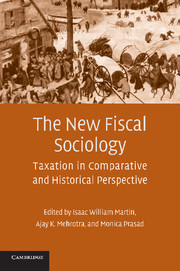Book contents
- Frontmatter
- Contents
- List of Contributors
- Acknowledgments
- Foreword
- 1 The Thunder of History: The Origins and Development of the New Fiscal Sociology
- PART ONE SOCIAL SOURCES OF TAXATION: AMERICAN TAX POLICY IN COMPARATIVE PERSPECTIVE
- 2 “The Unfair Advantage of the Few”: The New Deal Origins of “Soak the Rich” Taxation
- 3 What Americans Think of Taxes
- 4 Read Their Lips: Taxation and the Right-Wing Agenda
- 5 Making Taxes the Life of The Party
- PART TWO TAXPAYER CONSENT
- PART THREE THE SOCIAL CONSEQUENCES OF TAXATION
- References
- Index
3 - What Americans Think of Taxes
Published online by Cambridge University Press: 13 January 2010
- Frontmatter
- Contents
- List of Contributors
- Acknowledgments
- Foreword
- 1 The Thunder of History: The Origins and Development of the New Fiscal Sociology
- PART ONE SOCIAL SOURCES OF TAXATION: AMERICAN TAX POLICY IN COMPARATIVE PERSPECTIVE
- 2 “The Unfair Advantage of the Few”: The New Deal Origins of “Soak the Rich” Taxation
- 3 What Americans Think of Taxes
- 4 Read Their Lips: Taxation and the Right-Wing Agenda
- 5 Making Taxes the Life of The Party
- PART TWO TAXPAYER CONSENT
- PART THREE THE SOCIAL CONSEQUENCES OF TAXATION
- References
- Index
Summary
Although taxation constitutes one of the main linkages between citizens and government, the study of public opinion and taxes has generally taken a backseat to accounts of the elite politics of tax policy. Given that ordinary citizens rarely pay much attention to public affairs, and often know little about complex policy issues such as taxation, this customary emphasis on elites is understandable. Moreover, the conventional wisdom that people simply hate taxes suggests that studying public opinion toward taxation would be a less than enlightening exercise.
However, by utilizing newly available data on public opinion toward taxes, I find considerable variation in tax attitudes over the past six decades and argue that much of this variation can be explained by objective conditions, chiefly the cost of taxes. From the very beginning of mass taxation, ordinary Americans have been sensitive to the level of taxes they pay: When costs are higher, they have more negative feelings about taxes; when taxes are lower, they are relatively more sanguine. This is true both cross-sectionally – as shown in an analysis of early attitudes among different income groups toward regressive and progressive taxes – and across time, as demonstrated with longitudinal data.
Moreover, the public's responsiveness to the cost of taxes has grown over time, with the relationship between tax attitudes and the level of taxes becoming tighter after the 1970s than it was before.
- Type
- Chapter
- Information
- The New Fiscal SociologyTaxation in Comparative and Historical Perspective, pp. 48 - 67Publisher: Cambridge University PressPrint publication year: 2009
- 22
- Cited by



